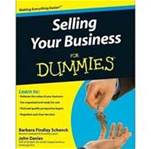
To paraphrase Paul Simon, you have nearly fifty ways to leave your business and selling comprises six of them. Your selling options range from the obvious cut-all-the-strings approach by selling your business outright to selling off a portion of your business, ridding yourself of some of your responsibilities while staying involved for some time into the future. Before you slip out the back, Jack, or make a new plan, Stan, it is worth knowing the lineup of options you can explore in your effort to get yourself free.
Selling outright and being done with it
Selling your business once-and-for-all is probably the exit option you had in mind. It is also the hope of the vast majority of entrepreneurs seeking a business exit now or in the near future and it is work, someone else takes over your business, it lives in to the future and you reap value that can fund either your retirement or the next chapter of your entrepreneurial life.
Who is likely to make an outright purchase of your business? Likely buyers could be any of the following:
Selling your portion to a current partner
Many business owners sell their portion of the business to a current partner, especially in professional practices where partnerships are formed around the idea that in time one partner will transition his or her ownership to the other partner or partners. Partnerships should always be launched with buy-sell agreements that define the terms of how on partner sells to another. If you are in a partnership your sale game plan is set buy this buy-sell agreement.
Selling to another business
If you sell your business to another business that is engaged in the same or similar line of business as yours the buyer is known as a strategic buyer. Strategic buyers seek to expand the capabilities, breadth, profitability, and competitiveness of their existing businesses by acquiring the strengths of a business such as yours. They are not looking to buy your business for its ability to fund a good owner salary or build equity for future sales they are looking to blend or integrate your business into their own. The way strategic buyers calculate what they will pay for a business is different from a buyer with a financial objective. Strategic buyers usually have one of the following characteristics:
• A business that’s larger and financially stronger than yours
• A business with long-range plans that would benefit from the strengths of your business
• A business that bases its purchase price on an estimation of how much value your business will add to the buyers existing business over the next few years
• A business that will purchase your business only if it determines that the purchase price is less than the cost of creating the advantages from scratch
• A business that able to pay cash or obtain financing to purchase your business
Selling to an individual with financial objectives
If you want to lay a bet, bet that when your business sells, it will sell to a buyer with financial objectives. What’s more, bet that the buyer is living in or has already decided to move to your home area.
The vast majority of small business sales are to financially motivated individuals who participate in the business sale industry calls intramarket transactions, which is another way of saying that all the players – the buyer, seller, and broker are in the same market area. Some of the following motivate the typical small business buyer:
• A business purchase allows the buyer to be in business from day one
• Buying a business is less risky than starting one
• It is easier to borrow funds to buy a business than to start one
• Buying a business delivers a three-pronged return on the investment
• A future payoff when the business is developed into a great success and can be sold to a new round of owners
Smart buyers only invest in businesses with strong and climbing sales, good earnings, a unique and valued product or service, a healthy marketplace, proven operations, and customers who are likely to migrate with the business under new ownership.
Transitioning to next-generation family
One out of three small businesses transfer to next-generation family instead of being sold to outsiders. That is why you see so many businesses with names like Smith and Sons. However, sons do not usually take over a business; instead, usually one son or daughter emerges as the controlling heir. If you do plan to sell to family here are some issues to consider:
• If you have more than one interested heir, determine which will assume control before transfer begins. Develop a succession plan, groom your successor, and determine how to transfer ownership and receive compensation.
• Determine how the heir who takes over your business can begin to buy you out even before he or she is financially able to do so.
• Develop a means for transferring some of your business’s value to your other heirs so they receive a portion of your wealth even though they do not receive business ownership.
Selling but staying involved
Not every owner who wants to sell also wants out of the business – at least not right away. Many still want the sense of involvement, the security of an ongoing paycheck and benefits, and a role in the business world. Here are some options for selling and staying involved:
Selling part to key employee
This approach relies on the fact that you have found an employee who has a desire to take over your business and an entrepreneurial spirit and expertise that matches or exceeds you own. What’s more, the person would be one you admire, trust, and are willing to invest in. because in most cases the chosen employee will not be in a financial position to purchase all or part of your business and you will essentially make the person your partner until the handoff is complete
After identify the right person you can begin to share ownership buy selling him or her portion of your business for cash or by transferring a share of your business in lieu of salary increases or cash bonuses. An agreement stating this key employee will be your successor at some point in the future and will then full buy you out of your business.
This approach is not one to take lightly or without legal advice. You need to hammer out the details including what to do if the employee quits, dies, or is fired, what to do if there are disagreements, and what to do if in the future you want to sell your shares to someone else.
Selling part to another business
Selling part of your business could be to benefit from a strategic partnership with a key business partner who could lend financial operational distribution production or marketing strength to your business. Another reason would be to start a succession plan to gradually sell to the other business and avoid the disruption of immediate takeover.
Taking on a co-owner or partner
Under this scenario, you value your business, determine what percentage you want to sell draw up the legally binding partnership agreement and begin to work as one of the partners in your business rather than the sole owner. The essential component is the buy-sell agreement. Do not enter into a partnership without a buy-sell agreement
Selling to employees through Employee Stock Ownership Plan (ESOP)
An ESOP is a tax-qualified, defined-contribution employee benefit plan through which employees accumulate shares of the business. Through an ESOP, an owner can sell stock quickly or over years and the stock sale proceeds may be tax-free. An ESOP provides tax advantages if you are planning to sell to a key employee or group of employees. If you decide to consider and ESOP know that it is typically way out of do-it-yourself territory. Seek legal advice and consider the following:
• You are willing to invest the time and effort required to set up a plan
• You are willing to remain involved with your business over the significant transition period usually years between your sole ownership and assumption of ownership by one or more employees
• You have employees with the ability to take over your business, both from a managerial and a financial standpoint
** from the book Sell a Business for Dummies by Barbara Findlay Schenck, Business Advisor & Sunbelt’s CEO John Davies
About Sunbelt Business Advisors
Sunbelt Business Advisors is an elite division of Sunbelt, the largest organization of business brokers and M & A professionals in the world. With five offices in Minneapolis, Minnesota; Chicago, Illinois; and Milwaukee, Wisconsin, Sunbelt Business Advisors is a premier brokerage. The business brokers and M & A intermediaries of Sunbelt Business Advisors, consistently rank in the top performers of Sunbelt International. Because of this team’s expertise, it has been trusted with coordinating all of the national franchisor relationships for Sunbelt. Because of this interaction, Sunbelt Business Advisors has a unique ability to market businesses throughout Sunbelt internationally. Sunbelt truly has GLOBAL reach!




